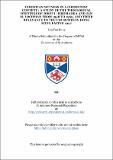Christian witness in a Communist context : a study of the theological writings of Josef L. Hromadka and Jan M. Lochman from 1948 to 1969, and their relevance to the churches in Hong Kong facing 1997
Abstract
This thesis discusses, assesses and reflects upon Christian witness in a particular communist context- that of Czechoslovakia from 1948 to 1969- and its possible relevance to Hong Kong when the People's Republic of China resumes the exercise of sovereignty over Hong Kong on July 1, 1997. This is carried out through a study of the theological writings of Josef L. Hromadka [1889-1969] and Jan M. Lochman [1922- ]. Christian witness is understood in three ways. Firstly, its form is described as a theology of mission; secondly, its approach is seen as contextual as regards a). relevance, b). comprehensiveness and c). practicability; thirdly, its nature is a call for discipleship. These characteristics serve as the criteria for this study. This thesis is divided into two parts: The first is a study of Hromadka and Lochman; and the second is a theological reflection on the context of the churches in Hong Kong facing 1997. The approach of the first part is not that of a comparative study between Hromadka and Lochman, but rather one which looks at the way in which they supplement each other. Hromadka and Lochman both adopt the same attitude towards communism and each of them contributes to the understanding of Christian witness in a communist context. The argument shows how they take their situations seriously, and try to find out the meaning of history in terms of its significance, not of its direction. Furthermore, in a communist context which is hostile to religion, they are not frightened by the so-called end of the Constantinian era, but instead welcome it as an opportunity for the Church to break through all kinds of traditional chains and social barriers and to function as a real Church. They support communism because they consider it as a step towards humanization; but they err in seldom criticizing the injustice of communist governments. In addition, their theological reflection is never merely an intellectual activity, but they put it into practice through their work for the Christian Peace Conference and for Christian-Marxist dialogue. The thesis employ the term "Prague line Theology" to describe the theology of Hromadka and Lochman in general which is seen as a form of political theology, a people's theology and a theology of the paradox of the unconditional "YES" and definite "NO" of the Gospel. In the second part, the relevance and importance of Hramadka and Lochman to the Hong Kong churches are discussed as follows. Christian witness implies, first of all, an examination of one's own faith; it demands social responsibility, promotes reconciliation, brings hope to the world, stands with the people and it requires Christians to take sides. A convergence between Hromadka and Lochman on the one hand and the Christians of Hong Kong on the other hand does not mean a blind transplantation of the Czechoslovak experience into the Hong Kong context, but rather a stimulus to the Hong Kong churches to do their own theology. In order to be able to manifest a living and energetic Christian witness in an era of fear and uncertainty, the Hong Kong churches must take seriously two aspects of their situation, namely, the historical "wound" of the people of Hong Kong and the need for the "modernisation" of China. A theological reflection in this context therefore needs to examine the understanding of the relationship between theology and history, and that between Christian hope and humanization in a dialectical way; that is, the Church starts from examining its inner life, making a concrete contribution to society, and finally working with the world for a better and humanized society.
Type
Thesis, MPhil Master of Philosophy
Collections
Items in the St Andrews Research Repository are protected by copyright, with all rights reserved, unless otherwise indicated.

